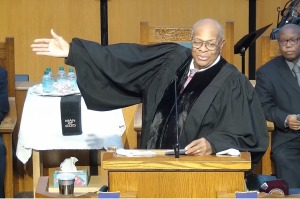Obama Charges GOP With Hypocrisy on Payroll Tax Cut
President Obama urged Republicans to pass an extension of the payroll tax cut in a Monday afternoon press conference. He also criticized Republicans for demanding that the extension be paid for when they did not demand the same of the Bush-era tax cuts.
“Now, I know many Republicans have sworn an oath to never raise taxes as long as they live,” Obama said. “How could it be that the only time there's a catch is when it comes to raising taxes on middle class families? How can you fight tooth and nail to protect high-end tax breaks for the wealthiest Americans and yet barely lift a finger to protect taxes going up for 160 million Americans who really need the help? It doesn't make sense.”
The tax breaks Obama referred to were passed in 2002 and 2003 under President George W. Bush. Those cuts lowered the tax rates for all income brackets, not just the brackets for high income Americans.
Obama signed a two-year extension of those rate cuts in December 2010. The extension was passed during a lame-duck session of Congress. Both houses of Congress were controlled by Democrats at the time, but they had lost seats in the Senate and lost control of the House in the election held the month before.
Obama had wanted to extend those rates for all but the top two income brackets, or those making less than about $200,000 per year for a married couple filing jointly. He continually refers to those in the top two brackets as “millionaires and billionaires.”
Though his party has even fewer seats and controls only one house in Congress, Obama again proposed increased taxes on the top two brackets to pay for his proposed jobs bill, which would also extend and expand the payroll tax cut.
“In my jobs bill, I proposed not only extending the tax cut, but expanding it, to give the typical working family a tax cut of $1,500 next year, paid for by asking a little more from millionaires and billionaires. A few hundred thousand people paying a little bit more could've not only extended the existing tax cut but expanded it. Last week, virtually every Senate Republican voted against that tax cut,” Obama said.
Obama also noted that Republicans did not demand that the Bush tax cuts be paid for, as they are demanding now with the payroll tax cut.
“Some Republicans, who have pushed back against the idea of extending this tax cut have said that we've got to pay for these tax cuts, and I just point out that they haven't always felt that way. Over the last decade, they didn't feel the need to pay for massive tax cuts for the wealthiest Americans, which is one of the reasons we faced such large deficits.”
Obama is correct that most Republicans had not demanded that the tax cuts under President Bush be paid for with spending cuts. One notable exception was Senator John McCain (Ariz.) who voted against the cuts for that very reason, and went on to face Obama in the 2008 election as the Republican presidential nominee.
The impulse to not add more to the national debt did not come, however, from Republicans who voted for the tax cuts under President Bush. Rather, it has been mostly the influence of Tea Party Republicans, first elected in 2010, who have demanded that the federal government not take on more debt.
Both parties in Congress are currently working on a compromise. Democrats offered to pay for the extension with a surtax on income above $1 million. Republicans proposed a three-year federal worker pay freeze, shrinking the federal workforce through attrition (reducing the number of new hires), and requiring millionaires to pay more for their Medicare benefits.
Republicans did not like the idea of adding a permanent tax increase to pay for a temporary tax cut. Democrats did not like the idea of having the federal workforce shoulder much of the burden.
If the two sides do not come to an agreement before Jan. 1, 2012, the payroll tax cut will expire and the average American family will pay about $1,000 per year in additional taxes.





























